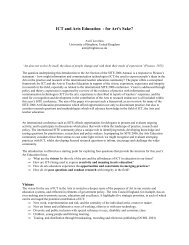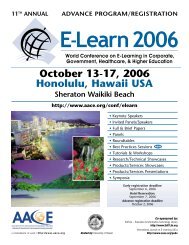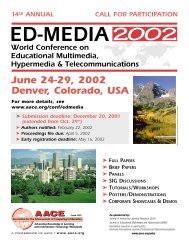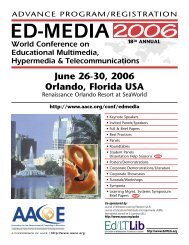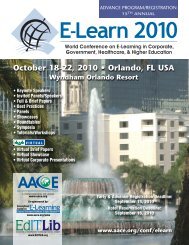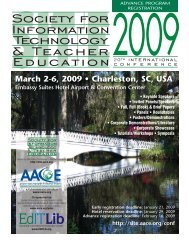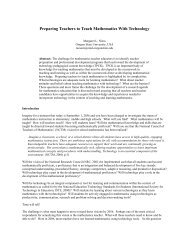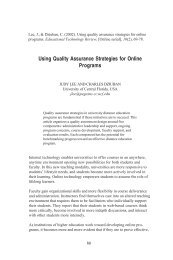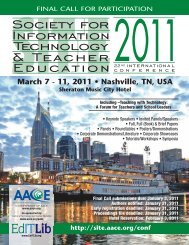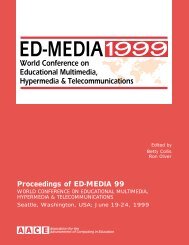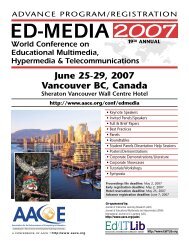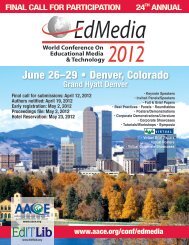ED-MEDIA 1999 Proceedings Book - Association for the ...
ED-MEDIA 1999 Proceedings Book - Association for the ...
ED-MEDIA 1999 Proceedings Book - Association for the ...
You also want an ePaper? Increase the reach of your titles
YUMPU automatically turns print PDFs into web optimized ePapers that Google loves.
Multimedia <strong>for</strong> Kids<br />
Antonio R. Bartolomé<br />
University of Barcelona, Spain<br />
bartolom@doe.d5.ub.es<br />
Karl Steffens<br />
University of Koeln , Germany<br />
karl.steffens@rs1.rrz.uni-koeln.de<br />
"Multimedia <strong>for</strong> Kids" ("Mediakids") is a project of research and development in <strong>the</strong> field of multimedia design<br />
and production, funded by “Eductional Multimedia Joint Call” from <strong>the</strong> European Commission, with <strong>the</strong><br />
participation of 5 universities, 4 schools and 2 private companies of 6 European countries. The project began in<br />
September 1998, and will last <strong>for</strong> is 2 years. This is a short description of this project and its main distinctive<br />
items.<br />
1. Objectives and basic description<br />
Research on educational multimedia shows that <strong>the</strong>re are a number of key aspects that in general receive little<br />
attention. To <strong>the</strong>se, we want to pay particular interest:<br />
. The fit of multimedia programs to <strong>the</strong> curriculum.<br />
. Individual differences between teachers.<br />
. Cultural differences.<br />
. The level of participation of end-users in <strong>the</strong> development process.<br />
. The consideration of metacognitive and non-cognitive dimensions in learning.<br />
. The integration of CD-ROM multimedia material and Internet based material into instructional processes.<br />
The project will evaluate <strong>the</strong> design, development and integration of multimedia materials into instruction<br />
processes through two parallel conceptions. The objective of <strong>the</strong> research is not to compare both ones but to<br />
analyze how end users participation in design and production process affects <strong>the</strong> final integration of products,<br />
and how two different multimedia designs could be integrated in actual educational environments.<br />
"Geometry <strong>for</strong> Kids" is a CD-ROM multimedia program, with Internet based communication elements, in an<br />
open -modular, flexible, interchangeable- design, to be developed by software companies but with participation<br />
of end-users -students and teachers- during <strong>the</strong> production process, and in a context of a methodological<br />
approach that takes into consideration <strong>the</strong> national and individual differences between countries, schools and<br />
teachers, as well as <strong>the</strong> metacognitive and non-cognitive aspects of learning.<br />
"As we were" is a Internet multimedia environment -<strong>the</strong> history of childhood in Europe- with some CD-ROM<br />
based resources. This environment af<strong>for</strong>ds a high level of communication of schools involved ei<strong>the</strong>r at national<br />
or European level. The environment is composed of elements and tools as well as methodological suggestions<br />
that teacher and students could integrate freely into <strong>the</strong>ir own curricular design. The CD-ROM offers multimedia<br />
elements -e.g. tools, samples as designs, video sequences, and sounds- compiled by schools that participate in<br />
<strong>the</strong> project.<br />
Our evaluative research will aim at clarifying if <strong>the</strong>se proposals answer schools needs and, at <strong>the</strong> same time, how<br />
<strong>the</strong>y will offer possibilities of being developed in an cost-efficiency way in an open market.<br />
This is a complex and important project, funded with half a million of dollars. There are o<strong>the</strong>r lines of research<br />
as well. One linked to pedagogical research is to develop solutions that try to apply to commercial products <strong>the</strong><br />
results of recent research about learning and related metacognitive aspects.



